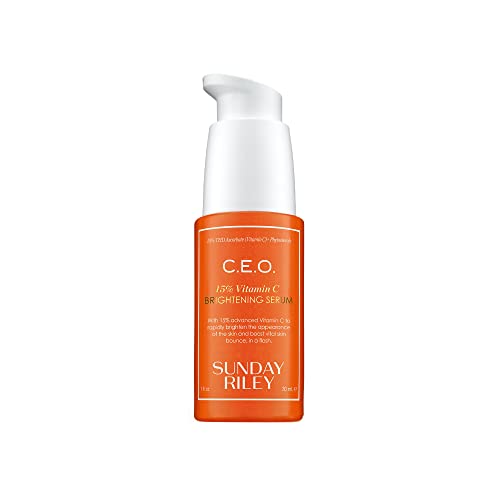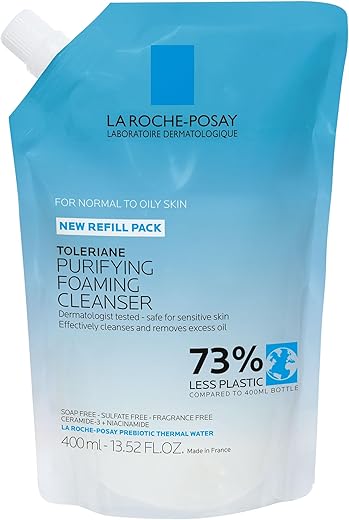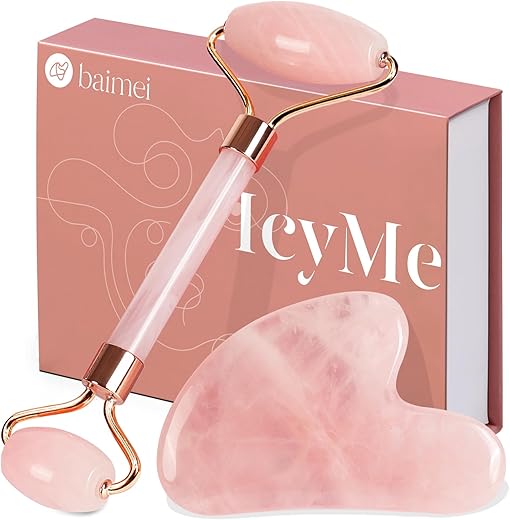
Is it necessary to consult a dermatologist before using a face brightening serum?
We all desire radiant and glowing skin, but with so many face brightening serums flooding the market, it’s easy to get overwhelmed. Before diving headfirst into the world of skincare, it’s essential to pause and consider the importance of consulting a dermatologist. In this blog post, we will explore why seeking professional advice before using a face brightening serum is crucial for your skin health. Together, let’s uncover the reasons behind this necessity and empower ourselves to make informed decisions about our skincare routine.
Top-rated serums to achieve a radiant and glowing complexion






What is a face brightening serum?
A face brightening serum is a skincare product that is specifically formulated to improve skin tone and reduce the appearance of dark spots. It is a lightweight and concentrated formula that is designed to be applied to the skin after cleansing and toning, but before moisturizing.


Purpose of a Face Brightening Serum
The primary purpose of a face brightening serum is to even out skin tone and reduce the appearance of hyperpigmentation. It contains active ingredients that work to lighten dark spots, fade acne scars, and brighten dull skin. By targeting specific areas of discoloration, a face brightening serum helps to create a more uniform and radiant complexion.
How Does a Face Brightening Serum Work?
A face brightening serum contains a combination of key ingredients that work together to improve skin tone. Here’s how these ingredients work:
- Vitamin C: This powerful antioxidant is a key ingredient in most face brightening serums. It helps to reduce the production of melanin, which is responsible for dark spots and hyperpigmentation. Vitamin C also boosts collagen production, resulting in brighter and firmer skin.
- Alpha Hydroxy Acids (AHAs): These natural acids, such as glycolic acid and lactic acid, exfoliate the skin by gently removing dead skin cells. This exfoliation process helps to reveal a brighter and more even skin tone while promoting cell turnover.
- Niacinamide: Also known as Vitamin B3, niacinamide works to inhibit the transfer of melanin, reducing the appearance of dark spots and hyperpigmentation. It also helps to strengthen the skin’s barrier, improving overall skin health.
- Licorice Root Extract: This natural ingredient contains glabridin, which has skin-lightening properties. It helps to fade dark spots and brighten the skin tone.
- Kojic Acid: Derived from mushrooms, kojic acid is another ingredient commonly found in face brightening serums. It inhibits the production of melanin, resulting in a more even complexion.
Benefits of Using a Face Brightening Serum
Using a face brightening serum can provide several benefits for your skin. Here are some of the key advantages:
- Evens out skin tone: A face brightening serum targets areas of hyperpigmentation and dark spots, resulting in a more uniform skin tone.
- Reduces the appearance of dark spots: By inhibiting melanin production, a face brightening serum helps to fade dark spots and acne scars.
- Improves skin radiance: The active ingredients in a face brightening serum work together to brighten dull skin, revealing a more radiant complexion.
- Promotes cell turnover: AHAs in the serum exfoliate the skin, promoting the shedding of dead skin cells and stimulating the growth of new, healthy cells.
- Enhances overall skin health: Ingredients like Vitamin C and niacinamide not only improve skin tone but also contribute to the overall health and vitality of the skin.
Choosing the Right Face Brightening Serum
When choosing a face brightening serum, consider the following factors:
- Ingredients: Look for serums that contain active ingredients like Vitamin C, AHAs, niacinamide, licorice root extract, or kojic acid.
- Suitability: Consider your skin type and any specific concerns you may have, such as sensitivity or acne-prone skin. Choose a serum that is suitable for your skin type.
- Concentration: Check the concentration of active ingredients in the serum. Higher concentrations may provide more noticeable results but can also increase the risk of skin irritation.
- Product Reviews: Read customer reviews or seek recommendations from trusted sources to gauge the effectiveness of the product.
In conclusion, a face brightening serum is a powerful skincare product that can help improve skin tone and reduce the appearance of dark spots. By incorporating a face brightening serum into your skincare routine, you can achieve a more even and radiant complexion.
Potential risks and side effects
Using face brightening serums can be an effective way to achieve a radiant and glowing complexion. However, it is essential to be aware of the potential risks and side effects associated with these products. Understanding these risks beforehand can help you make an informed decision and ensure the health and safety of your skin. In this blog section, we will discuss some common risks and side effects of using face brightening serums.



Skin Irritation
One of the most common risks associated with face brightening serums is skin irritation. The active ingredients in these products, such as exfoliating acids or strong botanical extracts, can sometimes cause redness, itching, or a burning sensation on the skin. This irritation is more likely to occur if you have sensitive skin or if the product is used incorrectly. It is essential to follow the instructions provided by the manufacturer and perform a patch test before applying the serum to your entire face.
Redness and Inflammation
In some cases, using face brightening serums can lead to redness and inflammation. This can be a temporary side effect that occurs as your skin adjusts to the product. However, if the redness and inflammation persist or worsen over time, it may indicate an allergic reaction or a sensitivity to one or more ingredients in the serum. In such cases, it is advisable to discontinue use and consult a dermatologist for further guidance.
Allergic Reactions
Allergic reactions to face brightening serums are relatively rare but can occur in some individuals. These reactions can manifest as itching, hives, swelling, or even difficulty breathing. If you experience any of these symptoms after using a face brightening serum, it is crucial to seek medical attention immediately. Allergic reactions can be severe and potentially life-threatening. Be sure to carefully read the ingredient list of any product you consider purchasing and avoid it if you have a known allergy to any of the listed ingredients.
Photosensitivity
Another potential risk associated with face brightening serums is increased photosensitivity. Some ingredients commonly found in these serums, such as alpha hydroxy acids (AHAs) or retinol, can make your skin more susceptible to sun damage. This means that if you use a face brightening serum during the day, it is essential to apply a broad-spectrum sunscreen with a high SPF to protect your skin from harmful UV rays.
Other Considerations
Apart from the risks mentioned above, it is important to consider a few other factors when using face brightening serums:
- Frequency of use: Overuse of face brightening serums can lead to skin irritation and damage. Follow the instructions provided by the manufacturer on how often to use the product.
- Combining products: Using multiple skincare products with active ingredients, such as exfoliants or retinol, can increase the risk of irritation and other side effects. It is recommended to consult a dermatologist before combining different products.
- Patch testing: Before applying a face brightening serum to your entire face, perform a patch test on a small area of your skin to check for any adverse reactions.
- Quality and reliability: Choose face brightening serums from reputable brands that prioritize safety, quality, and transparency in their ingredient lists.
By understanding the potential risks and side effects associated with face brightening serums, you can make an informed decision about whether to incorporate these products into your skincare routine. Remember, it is always wise to consult a dermatologist if you have any concerns or questions about using face brightening serums or any other skincare products.
Disclaimer: This blog section provides general information and should not be considered as medical advice. Always consult a dermatologist or skincare professional for personalized recommendations and guidance.
Expertise and knowledge in assessing skin conditions
When it comes to our skin, it’s essential to consult a professional who has the expertise and knowledge to assess and diagnose any issues accurately. Dermatologists are medical doctors specializing in skin, hair, and nail conditions. They have undergone extensive training and education, equipping them with the necessary skills to identify and treat a wide range of skin concerns.



Benefits of consulting a dermatologist:
- Dermatologists are trained to recognize the signs and symptoms of various skin conditions, such as acne, eczema, psoriasis, and skin cancer.
- They can provide an accurate diagnosis and recommend appropriate treatment plans based on the specific condition and individual needs.
- Dermatologists have access to the latest research, medical techniques, and technologies, ensuring that you receive the most up-to-date and effective treatments for your skin concerns.
- They can monitor the progress of your condition over time and adjust treatment plans accordingly.
Identifying potential allergies
Skin allergies can be frustrating and uncomfortable, and pinpointing the cause can be challenging. Consulting a dermatologist can help identify potential allergens and provide guidance on how to avoid them.
Benefits of consulting a dermatologist:
- Dermatologists are experienced in identifying common skin allergens, such as certain ingredients in skincare products, fragrances, and metals.
- They can perform patch testing to determine specific allergens causing skin reactions.
- By identifying and avoiding allergens, you can prevent future allergic reactions and minimize discomfort.
Recommending suitable products
The vast array of skincare products available can be overwhelming, and choosing the right ones for your specific needs can be a daunting task. Dermatologists can provide personalized recommendations based on your skin type, concerns, and any underlying conditions.
Benefits of consulting a dermatologist:
- Dermatologists have a deep understanding of different skincare ingredients and their effects on various skin types.
- They can recommend products that are suitable for your skin concerns, such as acne, dryness, or sensitivity.
- By using dermatologist-recommended products, you can optimize your skincare routine and enhance the health and appearance of your skin.
Personalized advice and avoiding adverse reactions
One of the significant advantages of consulting a dermatologist is the personalized advice they can provide. Every individual’s skin is unique, and what works for one person may not necessarily work for another. Dermatologists can tailor their recommendations to suit your specific needs, reducing the risk of adverse reactions and optimizing results.
Benefits of consulting a dermatologist:
- Dermatologists can assess your skin type, condition, and concerns to provide personalized advice on skincare routines, products, and treatments.
- They can help you avoid adverse reactions, such as irritation, redness, or allergic responses to skincare products.
- By receiving personalized advice, you can address your specific skin concerns more effectively and achieve healthier, more radiant skin.
In conclusion, consulting a dermatologist offers numerous benefits when it comes to assessing skin conditions, identifying potential allergies, and recommending suitable products. Their expertise, knowledge, and personalized advice can help you achieve optimal skin health and avoid adverse reactions. Whether you’re dealing with a specific concern or simply seeking guidance for your skincare routine, a dermatologist can play a crucial role in your skincare journey.
Factors to consider before using a face brightening serum
Achieving radiant and glowing skin is a desire shared by many. A face brightening serum can be a valuable addition to your skincare routine, helping to diminish dark spots and uneven tone. However, before incorporating such a product into your regimen, it is essential to consider several factors to ensure the best results for your unique skin. In this blog post, we will discuss these factors in detail, guiding you towards making an informed decision.



1. Skin Type
Understanding your skin type is crucial when selecting any skincare product, including a face brightening serum. Different skin types have different needs and react differently to various ingredients. Here are some key points to consider:
- Dry Skin: Look for serums that provide hydration and nourishment to combat dryness and promote a healthy glow.
- Oily Skin: Opt for lightweight, oil-free serums that control excess oil production and minimize the appearance of pores.
- Combination Skin: Seek serums that balance oil production while hydrating dry areas, ensuring an even skin tone.
- Sensitive Skin: Choose gentle serums with soothing ingredients to prevent irritation or redness.
2. Existing Skin Concerns
Identifying your existing skin concerns is crucial in determining the most suitable face brightening serum for you. Here are some common concerns and the corresponding ingredients that can address them:
- Dark Spots: Look for serums containing ingredients like vitamin C, niacinamide, kojic acid, or licorice extract, which help fade hyperpigmentation and brighten the skin.
- Dullness: Serums with exfoliating ingredients such as AHAs (alpha hydroxy acids) or BHAs (beta hydroxy acids) can promote skin cell turnover and reveal a brighter complexion.
- Uneven Skin Tone: Consider serums with natural skin brighteners like arbutin or bearberry extract to even out pigmentation and improve overall skin tone.
- Acne Scarring: Ingredients like retinol or niacinamide can help fade acne scars and promote a more even skin texture.
3. Medical History
Certain medical conditions or treatments may affect your skin’s sensitivity or compatibility with face brightening serums. It is advisable to consult with a dermatologist or skincare professional if you have any of the following:
- Pregnancy: Some ingredients, like retinoids, are not recommended during pregnancy due to potential risks. Consult with a healthcare professional for suitable alternatives.
- Skin Disorders: If you have any existing skin conditions like eczema or rosacea, it is important to choose a serum that is gentle and suitable for sensitive skin.
- Allergies or Sensitivities: If you have a history of allergies or sensitivities, carefully review the ingredient list to avoid potential triggers.
4. Ingredients in the Serum
Understanding the ingredients in a face brightening serum is essential to ensure its efficacy and safety for your skin. Here are some key ingredients to look for:
- Vitamin C: A potent antioxidant that brightens the skin, fades dark spots, and stimulates collagen production.
- Niacinamide: Helps even out skin tone, minimize pores, and strengthen the skin barrier.
- Retinol: Promotes cell turnover, reduces hyperpigmentation, and improves skin texture.
- Licorice Extract: Natural skin brightener that reduces the appearance of dark spots and discoloration.
- Hydroquinone: An effective ingredient for lightening dark spots, but it should be used with caution and under professional guidance due to potential side effects.
Professional Assessment for Optimal Results
To determine the most suitable face brightening serum for your specific needs, it is highly recommended to seek professional assessment from a dermatologist or skincare expert. They can evaluate your skin type, existing concerns, and medical history to recommend the best course of action. Additionally, they may suggest personalized skincare routines or combination therapies to enhance the results of using a face brightening serum.
In conclusion, incorporating a face brightening serum into your skincare routine can be a game-changer for achieving a radiant complexion. By considering factors such as skin type, existing concerns, medical history, and ingredient composition, you can select the most effective and safe serum for your unique needs. Remember, professional assessment is crucial for optimal results and to ensure the overall health of your skin.
The importance of seeking professional advice for optimal results
In conclusion, consulting a dermatologist before using a face brightening serum is crucial. Their professional knowledge and guidance will help ensure that the product is used safely and effectively, tailored to individual needs, and supports overall skin health. Don’t take any chances with your skin, trust the experts for the best results.

Hey, I’m Ava Wilson—a skincare enthusiast and a certified esthetician. I’m dedicated to sharing my knowledge and empowering others to achieve healthy, glowing skin through simple, effective routines and natural remedies. Join me on this exciting skincare journey, and let’s unlock your skin’s potential for a confident, beautiful you.





